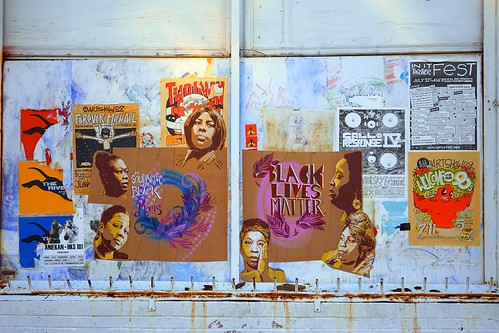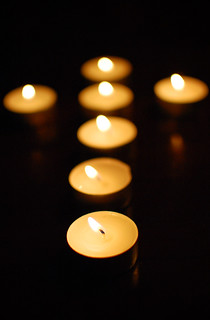
Dear White Christians,
It’s February, and I know you’re probably very busy with your Lenten preparations.
Especially if you work at a church like I do.
Ash Wednesday is right around the corner. Dry, brittle palms from last year have to be collected and burned, returned to dust. Supplies for the Shrove Tuesday pancake supper must be purchased, to say nothing of the decorations and flyers that need to be put up around the parish hall. Organizing the liturgy, music, lectors, and ministers for a mid-week service, regardless of its importance for observing a holy Lent, is no small thing.
But, in our holy hustle to the Lenten season, I hope that my white brothers and sisters in churches don’t forget that February is also Black History month.
Quite honestly, I wonder if perhaps, as much as we need Lent, white churches today might need Black History more. One has only to look at the baffling reaction to President Obama’s accurate comments regarding historical atrocities committed by Anglo Christians to see our desperate need for an education in Black history.
Because the history we’ve learned and absorbed as white people in this country is in reality only a partial history and is frequently a racist history.
So perhaps more than yet another 40 days of giving up soda and sweets, white Christians might need to give up their white, Anglo-centric version of history.
Imagine what would happen if white Christians around the country decided to observe Black History month with the same seriousness as we do Lent.
Of course, Black History month is not without its criticism. Too often, what’s offered during Black History month isn’t really Black history, but only a litany of exceptional people whose accomplishments truly dazzle. It’s a highlight reel of history that frequently doesn’t acknowledge the state and religious violence enacted against Black people in this country for hundreds of years.
White people love this part of Black history, because it allows us to focus on and learn only about those who succeeded despite the odds and oppression. It allows us largely to ignore the millions who were enslaved, murdered, oppressed, disenfranchised, and targeted.
And so we whitewash even Black history.
But white people need to come face-to-face with the unfiltered reality of true Black History.
So this is my challenge to my white brothers and sisters: Immerse yourself in Black history this month. All of it.
And listen. Listen to a history that is not your own, that confronts your own, that shatters your own.
And allow those stories to change you, to disrupt you, to transform you.
Of course, by the time February ends, if a white congregation has truly observed Black History month, then it will have naturally found itself wading, likely deeper than ever before, into the themes of Lent, that season of self-examination and repentance.
That natural segue into Lent is critical for white Christians, too. Because the temptation for white people, when confronted with our own historical and current complicity in violence against people of color, will be to seek quickly emotional absolution through “reconciliation” in the form of deeper relationships with people of color, multi-racial summits or other such ineffectual meetings of the mind.
As white Christians, we seem to desire racial reconciliation more than we desire racial justice, and we sadly tend to act as if reconciliation is possible without justice. In fact, it’s stunning we think reconciliation is the goal in the first place!
How shall white Christians be reconciled to our black brothers and sisters, exactly? Reconciliation assumes some previous golden days of friendship and getting along. To what are we returning in friendship? To the days of slavery, to segregation, to lynching? Or simply to our current days of police violence and brutality against Black Americans?
Racial reconciliation is a goal embedded with whiteness. We don’t want to do the hard work of repenting and learning to hear how we have wounded and continue to wound people of color through our deeds, known and unknown. But if we allow Black History month to lead us into Lent, into 40 days of fasting and penitence, perhaps we can begin to grasp the scale of the harm white supremacy has done and continues to do in our country today.
See, I don’t trust most white Christians to even start a dialogue or conversation about race with people of color. We largely don’t know how to navigate in a culture that isn’t centered around white people and their perspectives. We haven’t had to know.
So, if you engage in Black History month, before you think about seeking racial reconciliation, take 40 days and observe Lent. It takes more than 28 days to even begin to glimpse Black history.
So use the entire Lenten season to truly immerse yourself in Black history and the current reality of people of color.
And then repent.
Of the evil we have done.
The good we have left undone.
And the evil done on our behalf.

+ + +
Engaging with Black History may seem daunting, intimidating, or overwhelming for white people. So here are 10 suggestions, practices, and fasts for how we white people can begin to immerse ourselves or our churches in Black history this Lent. Perhaps, by the end of 40 days, we might be approaching a place where we can have an educated conversation about institutional racism in this country.
By the time Easter arrives, my prayer is that the word in your head as you proclaim the resurrection and the work of the church in regard to systemic racism is not reconciliation but reparations.
These are by no means exhaustive, and I am well-aware that these suggestions come, too, from the perspective of a white person. There will be blind spots.
1. Lent is most often associated with fasting, so if you are looking give up something, give up white people on social media. Unfollow them on Twitter. Unfriend them on Facebook. Get rid of the stream of white faces you like each day on Instagram. Stop reading white people’s blogs. Yes, even mine. And then, add Black voices. Add voices like Broderick Greer, Wil Gafney, Ta-Nehisi Coates, Christena Cleveland, Austin Channing, Micky Jones, and Lisa Sharon Harper. Or follow media outlets like Colorlines. Change up your podcasts you listen to. Move beyond NPR.
But don’t use this as an excuse to pester people of color with questions in the expectation they will hold your hand when you don’t understand what’s going on. Simply take the opportunity to fill your social media timelines with black voices and listen to them.
2. On Ash Wednesday, take some time to read slave narratives, those jarring and earth-shattering firsthand accounts of slaves like Harriet Jacobs. As you contemplate your own mortality, contemplate the scores of unnamed black people who have died because the color of their skin. As the ashes are imposed on your head, remember the 2.4 million Africans who died on the voyage to the Americas alone. Then explore the idea that this free labor and indiscriminate murder built the (white) wealth of this country and its industries.
3. During the 40 Days of Lent, read The New Jim Crow by Michelle Alexander. Read James Cone’s The Cross and the Lynching Tree. Read Howard Thurman’s Jesus and the Disinherited. Read books by W.E.B. DuBois and speeches by Malcom X.
4. Inventory your book collection and count up the percentage of white authors and black authors on your shelves. Check out Ferguson Reads. Commit to only reading black authors, particularly if you read fiction.
5. Subscribe to a black newspaper, especially if there is a local publication in your area. Or sign up for e-mail notices from Black advocacy groups.
6. Make it local. Explore the history of racism and oppression in your county. As a white person, you might be surprised to find monuments to racist violence against Black people in your town square. I know I was. Commit to bringing to light whatever systemic and institutional sins you find to your church, to your friends, and to your city leaders.
7. Create a cinematic dialogue and contrast between White and Black history. Pair films as studies in contrast to how history changes depending on your point-of-view.
Watch Gone with the Wind and 12 Years a Slave together. View Mississippi Burning and Selma side-by-side and consider the role of police and the FBI in the Civil Rights Movement. See 20th century history – and its cinematic disparities – through the eyes of Forrest Gump and through the eyes of Cecil Gaines in Lee Daniel’s The Butler. Watch Dirty Harry, and then watch Fruitvale Station. Watch Birth of a Nation or The Jazz Singer and then watch Bamboozled. Watch any Jesus film and then watch Son of Man (2006)
8. On Palm Sunday, read – or better yet – listen to Martin Luther King, Jr.’s less famous speeches and writings. Skip “I Have Dream” and hear instead “I’ve Been to the Mountaintop” and the radical King explain why America is going to hell. Here echoes of the radical Jesus who overturned tables in the Temple.
9. Take a Holy Week pilgrimage of repentance to a plantation, to a slave-trading site, or to the site of injustice or violence against Black people. Create a Stations of the Cross liturgy for the site and pray it individually and silently while there.
10. On Good Friday, search for the names of lynching victims from your county. Read their stories. Find as much information about them as possible. Share their stories so they are not forgotten. During the liturgy, hear and see their stories as the altar is stripped, as Jesus breathes his last. Understand the crucifixion of Jesus continues today.
So pick one, or two, or all of them as your Lenten practice this year. Add and create your own in the comments below.
But I invite you, my white brothers and sisters, to observe Black History month and to let it become a season of fasting, self-examination, and repentance.
I invite you to observe a holy Lent.
A Lent where black lives matter.















